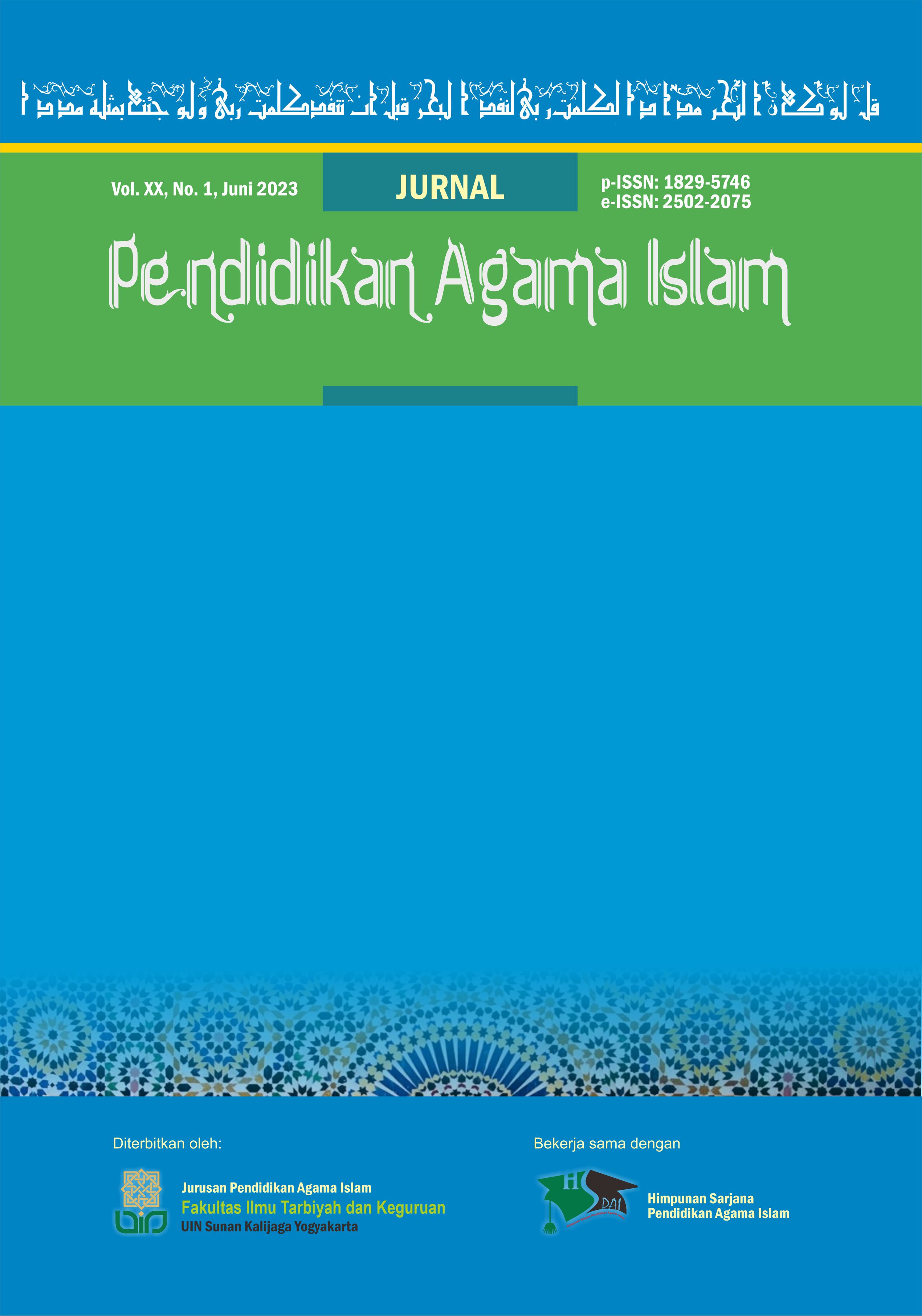Integrating Traditional and Modern Educational Methods: An Analysis of Islamic Values in 'Aqīdatu Al-‘Awām and the Application of Problem-Based Learning
##plugins.themes.bootstrap3.article.main##
Abstract
Purpose – This study was directed to analyze the Islamic values contained in the Book of ‘Aqīdatu Al-‘Awām and how these values can be taught in a modern context. In this study context, we sought to understand more about the history and context of the Yellow Book formation, specifically the Book of ‘Aqīdatu Al-‘Awām, and how they have influenced and can continue to influence Muslim education and society in Indonesia. This study is essential for understanding the history and role of the Yellow Book in shaping Islamic knowledge and identity in Indonesia, as well as helping the development of effective and relevant teaching methods that maintain these values in the context of modern education.
Design/methods/approach – This study has adopted an organized, structured, and systematic literature study research design, intending to explore Islamic values contained in the Book of ‘Aqīdatu Al-‘Awām, as well as offering a suitable learning model to teach it. Data was collected through documentation methods and analyzed using content analysis.
Findings – The study found that the Book of ‘Aqīdatu Al-‘Awām encompasses several values of Islamic education, including the value of aqidah, akhlaq, worship education, and Islamic history. We also found that traditional learning models, such as the sorogan or bandongan model, can be enriched by the integration of Problem-Based Learning (PBL) methods, providing opportunities to think critically, engage actively in learning, and develop problem-solving skills.
Research implications/limitations – Despite a significant contribution to Islamic education, this study has several limitations. For example, the subjective nature of our approach and data limitations. Therefore, further research needs to validate the effectiveness of PBL integration in the teaching of the book of ‘Aqīdatu Al-‘Awām.
Originality/value – This study is unique in analyzing the educational values in the Book of ‘Aqīdatu Al-‘Awām and proposing the integration of PBL in teaching it. These findings make an important contribution to the discourse of Islamic education, by showing how traditional Islamic educational institutions can adapt to modern educational paradigms, while still maintaining their unique identity and values at the same time. Future research is suggested to validate the effectiveness of this integration and explore the balance between traditional and innovative teaching methodologies in Islamic education.
Keywords:
Downloads
##plugins.themes.bootstrap3.article.details##
Copyright

This work is licensed under a Creative Commons Attribution-ShareAlike 4.0 International License.
Copyright Notice
Authors who publish with this journal agree to the following terms:
- Authors retain copyright and grant the journal right of first publication with the work simultaneously licensed under a Creative Commons Attribution License that allows others to share the work with an acknowledgement of the work's authorship and initial publication in this journal.
- Authors are able to enter into separate, additional contractual arrangements for the non-exclusive distribution of the journal's published version of the work (e.g., post it to an institutional repository or publish it in a book), with an acknowledgement of its initial publication in this journal.
- Authors are permitted and encouraged to post their work online (e.g., in institutional repositories or on their website) prior to and during the submission process, as it can lead to productive exchanges, as well as earlier and greater citation of published work.
References
Akbar, A., & Ismail, H. (2018). Metode Pembelajaran Kitab Kuning Di Pondok Pesantren Daarun Nahdhah Thawalib Bangkinang. Al-Fikra : Jurnal Ilmiah Keislaman, 17(1), Article 1. https://doi.org/10.24014/af.v17i1.5139
Bauto, L. M. (2014). Perspektif Agama Dan Kebudayaan Dalam Kehidupan Masyarakat Indonesia (Suatu Tinjauan Sosiologi Agama). JPIS (Jurnal Pendidikan Ilmu Sosial), 23(2), Article 2. https://doi.org/10.17509/jpis.v23i2.1616
Burdah, I. (2011). The method of interpreting the lexicon of the general concept and historical research. Journal of Indonesian Islam, 5(2), 354–376. Scopus. https://doi.org/10.15642/JIIS.2011.5.2.353-377
Burhanudin, J. (2022). Two Islamic Writing Traditions In Southeast Asia. Al-Jami’ah, 60(1). Scopus. https://doi.org/10.14421/ajis.2022.601.1-28
Dahlan, Z. (2018). Khazanah Kitab Kuning: Membangun Sebuah Apresiasi Kritis. Ansiru Pai : Pengembangan Profesi Guru Pendidikan Agama Islam, 2(1), Article 1. https://doi.org/10.30821/ansiru.v2i1.1624
Izzah, I. (2018). Peran Pendidikan Agama Islam Dalam Membentuk Masyarakat Madani. Pedagogik: Jurnal Pendidikan, 5(1), Article 1. https://doi.org/10.33650/pjp.v5i1.219
Malik, M. P. A., & Hamid, F. A. F. A. (2022). (17th Century Classical Islamic Malay Writing: A Discussion of Selected Books). Journal of Al-Tamaddun, 17(2), 181–192. Scopus. https://doi.org/10.22452/JAT.vol17no2.14
Malikhatun Nasikhah, N. 19204020004. (2021). Efektivitas Metode Sorogan Dengan Bandongan Dalam Peningkatan Kemampuan Membaca Kitab Kuning Santri Di Pondok Pesantren As-Salafiyyah Mlangi Sleman Yogyakarta Tahun 2020/2021 [Masters, Uin Sunan Kalijaga Yogyakarta]. https://digilib.uin-suka.ac.id/id/eprint/44632/
Mustofa, M. (2019). Kitab Kuning Sebagai Literatur Keislaman Dalam Konteks Perpustakaan Pesantren. Tibanndaru : Jurnal Ilmu Perpustakaan dan Informasi, 2(2), Article 2. https://doi.org/10.30742/tb.v2i2.549
Nafisa, R. (2020). Penerapan Program Kajian Kitab Tauhid Nazam Aqidatul Awwam Dalam Penanaman Nilai Aqidah Siswa Di Mi Nidhomiyah Kwadungan [Undergraduate, IAIN KEDIRI]. http://etheses.iainkediri.ac.id/1607/
Nurjanah, E., Adisendjaja, Y. H., & Kusumastuti, M. N. (2018). The observation of biology implemented by integrated religion values in integrated Islamic school (Decriptive Study in X Integrated Senior Hight School Tasikmalaya). In Aisyah S., Megasari R., Kusumawaty D., Jupri A., Rusyati L., Rosjanuardi R., Hasanah L., Yulianti K., Wiji null, Samsudin A., & Nuraeni E. (Eds.), J. Phys. Conf. Ser. (Vol. 1013, Issue 1). Institute of Physics Publishing; Scopus. https://doi.org/10.1088/1742-6596/1013/1/012022
Nurtawab, E., & Wahyudi, D. (2022). Restructuring Traditional Islamic Education in Indonesia: Challenges for Pesantren Institution. Studia Islamika, 29(1), 55–81. Scopus. https://doi.org/10.36712/sdi.v29i1.17414
Putro, A. A. Y., & Suryono, Y. (2019). New Tradition of Pesantren in Character Education. J. Phys. Conf. Ser., 1254(1). Scopus. https://doi.org/10.1088/1742-6596/1254/1/012002
Raco. (2010). Metode Penelitian Kualitatif, Jenis, Karakteristik, dan Keunggulan. Grasindo.
Sauri, S., Rahmat, A. S., Nursyamsiah, N., & Nursaidah, L. L. (2016). Explaining the values embedded in the teaching of Arabic using sorongan and bandongan methods in Indonesian Traditional Muslim Boarding Schools-Pesantren. Man in India, 96(8), 2537–2550. Scopus.
Stefan Titscher, et al. (2009). Metode Analisis Teks & Wacana. Pustaka Pelajar.
Suharsimi Arikunto. (1998). Prosedur Penelitian Suatu Pendekatan Praktek. Rineka Cipta.
Umuroh, K., & Agoestanto, A. (2017). Implementasi Model Pembelajaran Pbl Terhadap Kemampuan Berpikir Kritis Dan Kedisiplinan Siswa. Prisma, Prosiding Seminar Nasional Matematika, 532–538.
361
Views
508
Downloads





